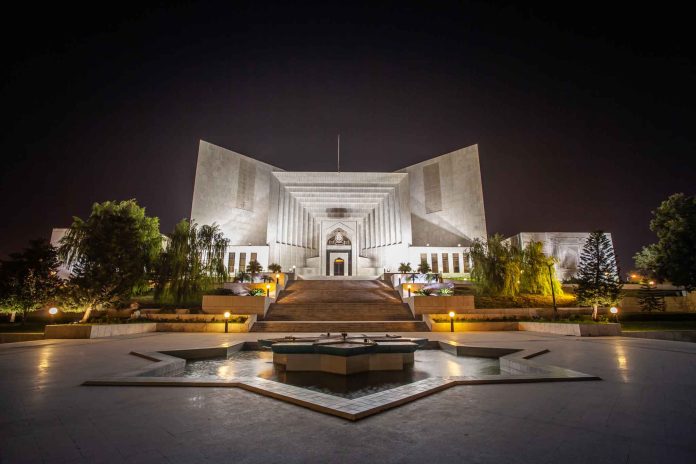——- SC bench upholds March 2024 ruling of PHC
——- 7:5 majority verdict announced by Justice Aminuddin
——- Justice Panhwar recuses himself from SC bench
——- Hamid Khan argued there were precedents indicating that Court could not hear case
Staff Report
ISLAMABAD: In a major setback for the Pakistan Tehreek-e-Insaf, the Supreme Court’s Constitutional Bench has accepted review petitions and ruled that the Imran Khan-founded party is not entitled to seats reserved for women and minorities in the national and provincial assemblies.
The verdict was announced by a 10-member bench headed by Justice Aminuddin Khan on Friday.
Announcing the short ruling, Justice Aminuddin Khan said, “Justice Aminuddin Khan, Justice Mussarat Hilali, Justice Naeem Akhtar Afghan, Justice Shahid Bilal Hassan, Justice Hashim Khan Kakar, Justice Aamir Farooq and Justice Ali Baqar Najafi all review petitions are allowed and impugn majority judge-ment dated July 12, 2024 is set aside as a consequence thereof civil appeals … filed by SIC are dismissed and judgement rendered by the PHC is restored.”
The head of the bench further said: “Whereas Justice Jamal Khan Mandokhail for reasons to be rec-orded, later the party allowed the review petitions and maintained its review petitions and maintained his original order with regard to 39 seats but reviewed the majority judgement to the extent of 41 seats.
Whereas, Justice Mohammad Ali Mazhar and Justice Syed Hasan Azhar Rizvi, for reasons to be recorded later, also reviewed the judgaement and allowed the review petitions with the rider that since the factual controversy or disputed questions of fact neither could be resolved by the PCH or this court in original or review jurisdiction.
Therefore, directions are issued to the ECP to examine and con-sider the nomination papers/declaration and other relevant documents of all 80 returned candidates by means of noble exercise with regard to their affiliation …” The Pakistan Muslim League-Nawaz (PML-N), the Pakistan Peoples Party (PPP), and the Election Commission of Pakistan have filed review petitions against last year’s Supreme Court July 12, 2024 rul-ing that the Pakistan Tehreek-e-Insaf (PTI) was entitled to reserved seats for women and minorities in the national and provincial assemblies.
Justice Mansoor Ali Shah of the SC’s full bench announced the 8-5 majority verdict, nullifying the Pesh-awar High Court’s (PHC) order wherein it had upheld the Election Commission of Pakistan’s (ECP) deci-sion denying the reserved seats to the Sunni Ittehad Council (SIC).
In its July 12 verdict, eight out of 13 judges ruled that 39 out of a list of 80 MNAs were and are the re-turned candidates of the PTI.
Last year in July, the top court ruled that the PTI was eligible for the allocation of reserved seats.
The decision not only paved the way for the PTI’s return to parliament, which was kicked out of the February 8 polls owing to the ECP’s December 2023 ruling, but had also increased the pressure on the coalition alliance by changing the composition of the National Assembly.
Justice Mansoor Ali Shah of the SC’s full bench announced the 8-5 majority verdict, nullifying the Pesh-awar High Court’s (PHC) order wherein it had upheld the Election Commission of Pakistan’s (ECP) deci-sion denying the reserved seats to the SIC.
It was supported by a majority of eight judges, comprising Justice Syed Mansoor Ali Shah, Justice Mu-nib Akhtar, Justice Muhammad Ali Mazhar, Justice Ayesha A. Malik, Justice Athar Minallah, Justice Syed Hasan Azhar Rizvi, Justice Shahid Waheed and Justice Irfan Saadat Khan.
The PTI candidates did not contest the polls on a single symbol, forcing them to join hands with the SIC, but that could not get the party the reserved seats as the ECP ruled against them.
In its decision, the court declared that the lack or denial of an election symbol does not in any manner affect the Constitutional or legal rights of a political party to participate in an election, whether general or by, and to field candidates and that the commission is under a Constitutional duty to apply all statu-tory provisions accordingly.
“PTI was and is a political party, which secured general seats in the national and provincial assemblies in the general elections of 2024,” read the verdict.
According to the verdict, the PHC’s judgment dated March 25 is set aside. “The order of the ECP dated March 1 is declared to be ultra vires to the Constitution, without lawful authority, and of no legal ef-fect,” it said.
The top court remarked that PTI, as a political party, has a legal and constitutional right to reserved seats.
Rejecting the appeals filed by the SIC, the apex court said that the party cannot take reserved seats as per the Constitution.
The ruling said that the PTI should present a list of eligible candidates for the reserved seats to the electoral body within 15 days after the verdict.
It added that the ECP should then publish the list of reserved seats of the candidates on its website within seven days.
“The seats allocated to the PTI after this stage will be considered as their seats. [Once the PTI gets its seats in parliament], it will be eligible for the reserved seats,” said the ruling.
However, former CJP Qazi Faez Isa and Justice Jamal Khan Mandokhail had a differing order, which was supported by Justice Amin-ud-Din Khan and Naeem Akhtar Afghan.
Meanwhile, Justice Yahya Afridi differed with it, stating that the PTI fulfils the conditions prescribed for a political party under the enabling provisions of the Constitution and the law to allocate reserved seats for women and non-Muslims, but SIC doesn’t.
He directed the ECP to decide the allocation of reserved seats for women and non-Muslims to political parties in the NA and provincial assemblies, after hearing all the parties concerned, and revisit its earli-er decisions, within seven days.




